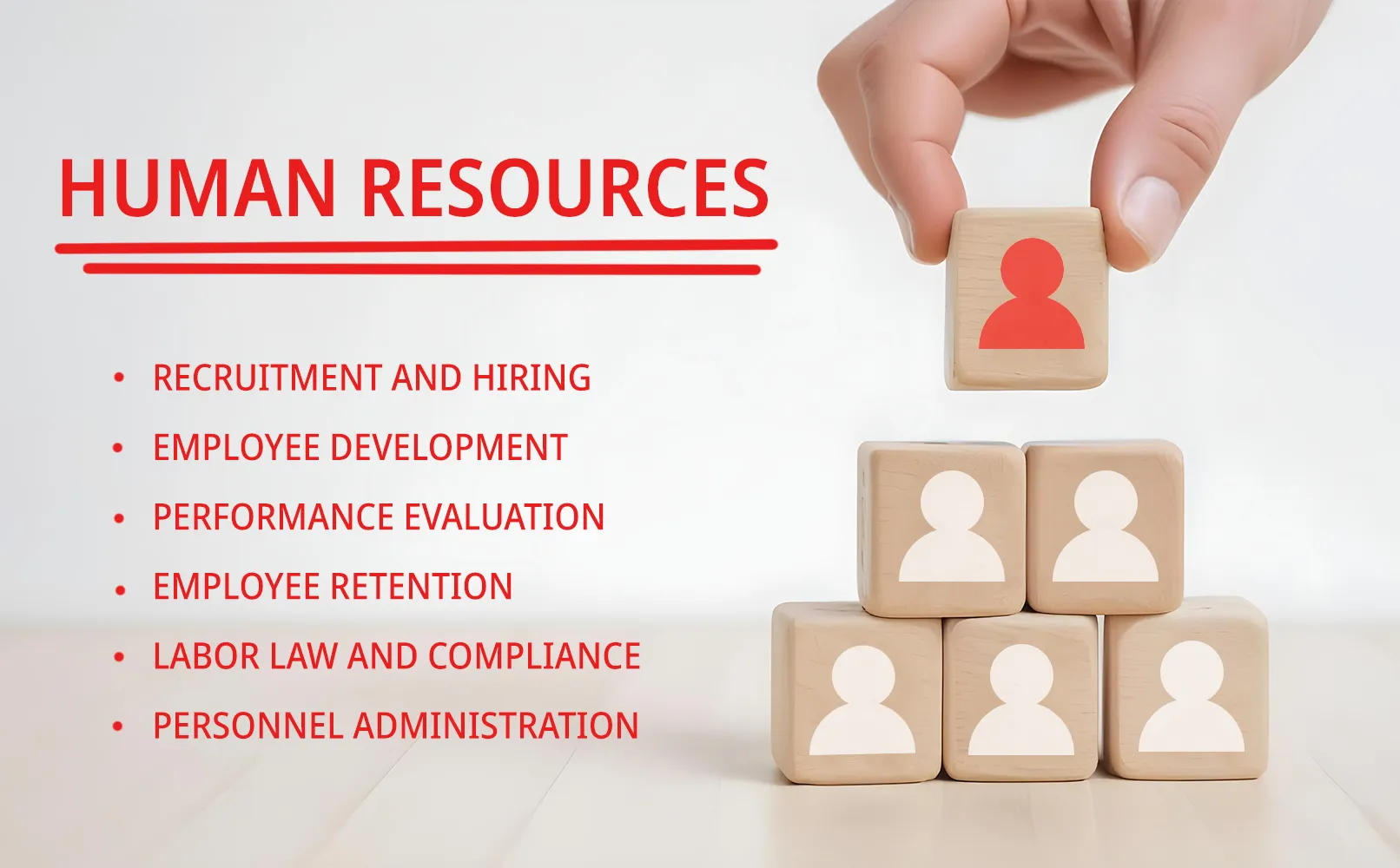What is Human Resources: Definition, Tasks, Goals
The significance of Human Resources (HR) is steadily increasing as businesses recognize that employees are their most valuable asset. According to a recent study by LinkedIn, the demand for HR specialists has risen by 30% in the last three years. This underscores the relevance of the topic, especially at a time when talent management and employee retention are becoming increasingly important to remain competitive. We have already extensively discussed tips on employer attractiveness here on the blog.

Table of Contents
Human Resources: Definition of the Term
Human Resources (HR) refers to the area of a company that deals with everything related to employees. The HR department is responsible for finding the right employees, taking care of them, and developing them so that they can contribute optimally to achieving the company's goals.
In simple terms: The HR department ensures that the right people are hired and feel comfortable within the company, can develop, and perform their work well. This includes tasks such as recruiting new employees, training, evaluations, and creating a pleasant work environment.
What Tasks are included in Human Resources?
Human Resources encompasses a variety of tasks, all aimed at effectively managing employees and getting the best out of them. Some of the key tasks in the HR field are:

- Recruitment and Hiring: The HR department looks for suitable candidates for open positions, conducts interviews, and hires new employees. The goal is to attract the best talents for the company.
- Employee Development: This includes training, further education, and career planning. HR ensures that employees acquire the necessary skills and knowledge to be successful in their roles and to advance within the company.
- Performance Evaluation: HR is responsible for regularly evaluating employee performance. This helps to identify the strengths and weaknesses of employees and to initiate appropriate measures for improvement or promotion.
- Employee Retention: HR develops strategies to increase employee satisfaction and strengthen their loyalty to the company. This includes measures such as a positive work environment, employee benefits, and recognition systems.
- Employment Law and Compliance: HR ensures that the company complies with all legal requirements. This includes monitoring employment contracts, working hours, occupational health, and safety regulations.
- Personnel Administration: This includes administrative tasks such as payroll processing, leave management, and maintaining personnel records. These tasks are important to ensure the smooth operation of the company.
Human Resources is thus a broad field covering many different areas of tasks, all aimed at maximizing the potential of employees and advancing the company towards its goals.

Human Resource Management (HRM): What is it?
Human Resource Management (HRM) is closely related to the term Human Resources (HR) and describes the strategic and systematic management of a company's employees. While HR covers the entire area of employee management, HRM focuses on planning, organizing, and controlling HR activities to achieve long-term company goals.
HRM aims to lead and develop employees in a way that allows them to make the best use of their skills. This includes workforce planning, the development of training programs, and the design of performance evaluation and incentive systems. HRM also takes care of creating a corporate culture that promotes motivation and productivity.
In short, HRM is the strategic part of Human Resources and ensures that all HR processes and activities are aligned with the company's strategy to achieve both individual and organizational goals.
An HR strategy is the long-term plan ⚙️ of a company on how it wants to optimize and develop its employees to achieve corporate goals. It ensures that personnel work is systematic and targeted and closely linked to the overall strategy of the company.
Some of the most well-known HR strategies include:
- Talent Management: This strategy focuses on attracting, developing, and retaining the best talents in the company in the long term. Talent management includes recruiting professionals, developing them through training programs, and measures for employee retention. The goal is to build a high-performing team that drives the company forward.
- Employee Retention: This strategy aims to increase employee satisfaction and loyalty to minimize turnover. Measures such as a positive work environment, competitive compensation, and clear career opportunities help retain employees in the long term, which in turn promotes the stability and productivity of the company.
- Diversity Management: This strategy promotes a diverse and inclusive work environment. By consciously hiring and promoting employees with different backgrounds, as well as through training programs to enhance awareness of diversity, companies can improve the innovation and problem-solving capabilities of their teams.
- Succession Planning: This proactive strategy ensures that key positions in the company can be filled quickly and competently. By identifying talents early and preparing them for future leadership roles, the company's continuity is ensured even in times of change.

Who works in Human Resources?
In the Human Resources (HR) field, various professionals work who each take on specific tasks within personnel administration. Here are some of the most commonly used job titles:
- HR Specialist: Responsible for specific areas such as recruitment, training, or payroll. HR Specialists are often specialized in a specific field and take care of implementing HR strategies.
- HR Manager: Oversees the entire HR department and ensures that all HR activities are aligned with the company's goals. HR Managers coordinate the work of HR Specialists and develop HR strategies.
- Recruiter: Specialized professional for recruiting new employees. Recruiters identify and attract talent, conduct job interviews, and accompany the hiring process.
- Learning and Development Manager: Responsible for the training and development of employees. They plan and implement training programs to help employees improve their skills and advance in their careers.
- HR Business Partner: This role closely connects the HR department with the other departments of the company. HR Business Partners work directly with managers to ensure that HR strategies support business goals.
- HR Legal Specialist: Experts in labor law issues who ensure that the company complies with all relevant laws and regulations. They advise the company on legal matters affecting employees and minimize legal risks.
- HR Administrator: Responsible for administrative tasks such as maintaining personnel records, payroll, and leave management. HR Administrators ensure that daily HR operations run smoothly.
- Occupational Psychologist: Plays a key role in HR, especially when it comes to the mental health and well-being of employees. Occupational psychologists, for example, conduct stress management programs, provide advice on workplace conflicts, and support the development of a healthy work culture.
For all these professions in the HR field, solid knowledge in areas such as personnel management, labor law, and psychology is essential. The professionals and managers must bring not only organizational and legal knowledge but also a deep understanding of interpersonal dynamics and the ability to deal with different personality types. This makes HR a field where expertise and social skills are in demand.
Conclusion: The crucial role of Human Resources
The success of a company depends significantly on the work of the Human Resources department and its team. Ultimately, it is not the customers but the managers and specialists who ultimately bring profit, and this is where the HR department plays a central role. Human Resources ensures that the company always has the right number of qualified employees who not only meet the requirements but are also satisfied and motivated.
Furthermore, the HR department is responsible for continuously developing, motivating, and retaining employees in the long term. By planning ahead and aligning the needs of employees with those of the company, HR significantly contributes to the stability and success of the company. Therefore, it is a misconception to view Human Resources only as **Personnel Department**. Rather, it is the department that lays the foundation for stable and successful corporate governance.
From Vitalii Shynakov
